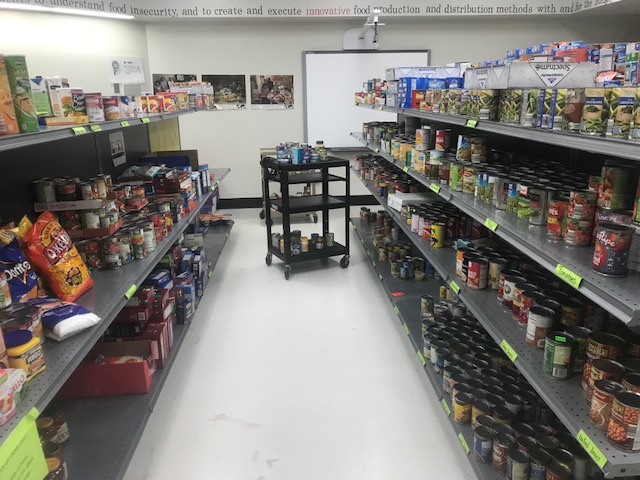District Pantry Helps Those in Need for the Holidays
“The shelves look pretty full, right? This amount of food will fill food bags for two weeks… and then the shelves are empty again. Your ongoing donations are vital to ensure the pantry’s success,“ Diane Peterson said. Parkway Food Pantry at Northeast Middle on Nov. 7, 2017.
December 13, 2017
The Parkway Food Pantry, headed by social workers such as Diane Peterson and Esmeralda Felix, helped many food insecure families this year have a Thanksgiving, giving away Thanksgiving kits to those in need across Parkway.
“We distributed about 50 Thanksgiving kits which were for our food insecure families at Parkway,” social worker Diane Peterson said. “Everything they would need for a Thanksgiving meal for the number of people they would have around their Thanksgiving table. That was a big accomplishment.”
The pantry has been open for a couple months, celebrating its one month anniversary on Nov. 10. Since its opening, the pantry has managed to distribute over 2,200 meals. The pantry aims to help those who are considered “food insecure”
“One in five students in Parkway are food-insecure,” Peterson said. ”Which means that they are not guaranteed dinner or adequate food on the weekends.”
There are two ways that those who are food insecure can acquire aid. For food insecure students, the Weekend Backpack Program is a weekly program that sends students home the last day of a school week with meals for the weekend, where they are not provided food like they are at school. Each student in a food insecure family is sent home with two breakfasts, two lunches, and three dinners, easy enough for Kindergarteners to carry home, but enough to feed them.
“Our goal and dream is to distribute 800 backpacks in the school district,” said Esmeralda Felix, social worker for the Central area. “Which is 56,000 meals in a week.”
Also available are one time requests, meant for those that are going through a bad patch. They can sign up for an order of food, listing circumstances such as allergies, health necessities, and cooking facilities, and they can receive an amount of food equivalent to three of four large paper bags of groceries.
“All they have to do is ask,” Felix said.
The service is not limited to students, however.
“Anyone in the district, whether they’re a student or not,” Peterson said. “Staff people are welcome to access food from the pantry, community members are also welcome to do that.”
The Parkway Food Pantry has encountered a lot of support in the short time they’ve existed. Schools have been doing food drives that have contributed significantly, parents in the community have also been collecting foods, and churches have also been running drives.
Others can provide support by delivering food on Thursdays to schools across Parkway, and others can help with something called the Mobile Market. The Mobile Market is a large delivery of produce from the St. Louis Food pantry, and in this delivery they receive such a large amount of produce, that they need a lot of help processing it all.
Peterson said that on one delivery from the food bank they received a literal ton of apples along with large boxes of pears, spaghetti squash, and cabbage.
The food pantry has also served as a learning lab for students. In many schools, such as Northeast Middle School, there are classes being taught on food waste, sustainability, food insecurity, and composting.
Peterson said that 40 percent of food purchased is wasted. “If you brought home five bags of groceries, it’d be like you just walked in your house and put two of them directly in the trash,” she said.
As such, this struggle against food insecurity is being considered a social justice issue, the problem being the access to food, and not the amount of food. Most of Parkway is considered a “food desert”, a food desert being anywhere without an adequate grocery store within a mile’s distance and where a vehicle is necessary to get to an adequate grocery store.
“Food insecurity is not really an economic issue,” Peterson said. “It’s more of a social justice issue relating to the access, and how food is produced in our country, and how it is distributed, and barriers that are created that prevent people that are hungry from getting food that is perfectly good to eat.”


